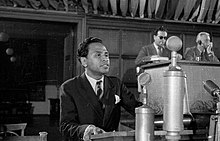Albert Rakoto Ratsimamanga
Born into a disgraced royal family; Ratsimamanga trained as a doctor of exotic medicine in French Madagascar and France, where he pioneered modern nutraceuticals.
Ratsimamanga returned to Madagascar and, with his wife, Suzanne Urverg-Ratsimamanga, in 1957, established the Malagasy Institute of Applied Research [fr] which specialised in herbal medicine.
Ratsimamanga is considered one of Madagascar's most renowned scholars and bestowed upon him the highest orders of merits nationally and internationally.
[1] He was the grandson of Prince Ratsimamanga, uncle and advisor to Queen Ranavalona III, who was executed in 1897 at the beginning of the French colonisation of Madagascar.
[4] Ratsimamanga work showed the presence of hormones in the diet and their role in the development of the body, while eliminating the factors of cellular detoxification, especially in the liver.
[13][14] IMRA succeeded in using the Syzygium cumini tree as an anti-diabetic agent,[15] and creating alternative medicines against malaria,[16][17] leprosy, asthma, lithiasis, blood pressure, hepatitis and other common conditions.
[28][29] Furthermore, Ratsimamanga represents the Malagasy Republic at the European Economic Community, UNESCO, and Food and Agriculture Organization.
[39] A commemorative stamp was issued in his memory in 2002,[40] and the Institut de France minted a coin tribute to Ratsimamanga.
[41] Ratsimamanga's legacy can be seen as a Chronological straddling of this diasporic projection with political independence and loyalty to an aristocratic ethos with a progressive rallying to a republican conception of citizenship




